研究生英语综合教程UNIT3课文及翻译(含汉译英英译汉)Word版
研究生综合英语3 unit 1, 2,3,7,8 原文+译文+重点【辛辛苦苦总结的期末资料】

1.Unit OneA Question of Degree对学位的质疑Perhaps we should rethink an idea fast becoming an undisputed premise of American life that a college degree is necessary(and perhaps even a sufficient) precondition for success.I do not wish to quarrel with the assumptions made about the benefits of orthodox education.I want only to expose its false god:the four-year, all-purpose,degree-granting college,aimed at the so-called college-age population and by now almost universally accepted as the stepping-stone to“meaningful”and “better”jobs.What is wrong with the current college/work cycle can be seen in the following anomalies:we are selling college to the youth of American as a take-off pad for the material good life.College is literally advertised and packaged as a means for getting more money through“better”jobs at the same time that Harvard graduates are taking jobs as taxi drivers.This situation is perversion of the true spirit of a university,a perversion of a humane social ethic and,at bottom,a patent fraud.To take the last point first,the economy simply is not geared to guaranteeing these presumptive “better”jobs;the colleges are not geared to training for such jobs;and the ethical propriety of the entire enterprise is very questionable.We are by definition(rather than by analysis)establishing two kinds of work:work labeled“better”because it has a degree requirement tagged to it and nondegree work,which,through this logic, becomes automatically“low level”.This process is also destroying our universities.The“practical curriculum”must become paramount;the students must become servants of big business and big government.Under these conditions the university can no longer be an independent source of scientific and philosophic truth-seeking and moral criticism.Finally,and most important,we are destroying the spirit of youth by making college compulsory at adolescence,when it may be least congruent with emotional and physical needs;and we are denying college as an optional and continuing experience later in life,when it might be most congruent with intellectual and recreational needs.Let me propose an important step to reverse these trends and thus help restore freedom and dignity to both our colleges and our workplaces.We should outlaw employment discrimination based on college degrees.This would simply be another facet of our“equal-opportunity”policy and would add college degrees to sex,age, race,religion and ethnic group as inherently unfair bases for employment selection.People would,wherever possible,demonstrate their capacities on the job.Where that proved impractical,outside tests could still serve.The medical boards,bar exams,mechanical,mathematical and verbal aptitude tests might still be used by various enterprises.The burden of proof of their legitimacy,however,would remain with the using agencies.So too would the costs.Where the colleges were best equipped to impart a necessary skill they would do so,but only where it would be natural to the main thrust of a university endeavor.The need for this rethinking and for this type of legislation may best be illustrated by a case study.Joe V.is a typical liberal-arts graduate,fired by imagination art and literature.He took a job with a large New York City Bank,where he had the opportunity to enter the“assistant manager training program”.The trainees rotated among different bank departments to gain technical know-how and experience and also received classroom instruction,including some sessions on“how to write a business letter.”The program was virtually restricted to college graduates. At the end of the line,the trainees became assistant bank managers:a position consisting largely of giving simple advice to bank customers and a modest amount of supervision of employees.Joe searched for some connection between the job and the training program,on the one hand,and his college-whetted appetites and skills on the other.He found nothing.In giving Joe preference for the training program,the bank had bypassed a few enthusiastic aspirants already dedicated to a banking career and daily demonstrating their competence in closely related jobs.After questioning his superiors about the system,Joe could only conclude that the“top brass”had some very diffuse and not-too-well–researched or even well-thought-out conceptions about college men. The executives admitted that a college degree did not of itself ensure the motivation or the verbal or social skills needed.Nor were they about what skills were most desirable for their increasing diverse branches.Yet they clung to the college prerequisite.Business allows the colleges to act as recruiting,screening and training agencies for them because it saves money and time.Why colleges allow themselves to act as servicing agents may not be as apparent.One reason may be that colleges are increasingly becoming conventional bureaucracies.It is inevitable,therefore,that they should respond to the first and unchallenged law of bureaucracy:expand!The more that college’s can persuade outside institutions to restrict employment in favor of theirclientele,the stronger is the college’s hold and attraction.This rational becomes even clearer when we understand that the budgets of public universities hang on the number of students“serviced”.Seen from this perspective,then,it is perhaps easier to understand why such matters as“university independence”or“the propriety”of using the public bankroll to support enterprises that are expected to make private profits, can be dismissed.Conflict of interest is difficult to discern when the interests involved are your own.What is equally questionable is whether a college degree,as such,is proper evidence that new skills that are truly needed will be delivered.A friend who works for Manpower Training Program feels that there is a clear divide between actual job needs and college-degree requirements.One of her chief frustration is the knowledge that many persons with ability to do paraprofessional mental-health work are lost to jobs they could hold with pleasure and profit because the training program also require a two-year associate art degree.Obviously,society can and does manipulate job status.I hope that we can manipulate it in favor of the greatest number of people.More energy should be spent in trying to upgrade the dignity of all socially useful work and to eliminate the use of human beings for any work that proves to be truly destructive of the human spirit. Outlawing the use of degrees as prerequisites for virtually every job that our media portray as“better”should carry us a long step toward a healthier society.Among other things,there is far more evidence that work can make college meaningful than that college can make work meaningful.My concern about this degree/work cycle might be far less acute;however,if everyone caught up in the system were having a good time.But we seem to be generating a college population that oscillates between apathy and hostility.One of the major reasons for this joylessness in our university life is that the students see themselves as prisoners of economic necessity.They have bought the media message about better jobs,and so they do their time.But the promised land of“better”job is, on the one hand,not materializing,and on the other hand the students is by now socialized to find such“better”jobs distasteful even if they were to materialize.One of the major improvements that could result from the proposed legislation against degree requirements for employments would be a new stocktaking on the part of all our educational pulsory schools,for example,would understand that the basic skills for work and family life in our society would have to be compressed into those years of schooling.Colleges and universities,on the other hand,might be encouraged to be unrestricted,as continuous and as open as possible.They would be released from the pressures of ensuring economic survival through a practical curriculum.They might best be modeled after museums.Hours would be extensive,fees minimal,and services available to anyone ready to comply with course-by-course demands.College under these circumstances would have a clearly understood focus,which might well be the traditional one of serving as gathering place for those persons who want to search for philosophic and scientific“truths”.This proposal should help our universities rid themselves of some strange and gratuitous practices.For example,the university would no longer have to organize itself into hierarchical levels:B.A.,M.A.,PH.D.There would simply be courses of greater and lesser complexity in each of the disciplines.In this way graduate education might be more rationally understood and accepted for what it is——more education.The new freedom might also relieve colleges of the growing practice of instituting extensive“work programs,”“internships”and“independence study”programs.The very names of these enterprises are tacit admissions that the campus itself is not necessary for many genuinely educational experiences.But,along with “external degree”programs,they seem to pronounce that whatever one has learned in life by whatever diverse and interesting routes cannot be recognized as increasing one’s dignity,worth,usefulness or self-enjoyment until it is converted into degree credits.The legislation I propose would offer a more rational order of priorities.It would help recapture the genuine and variegated dignity of workplace along with the genuine and more specialized dignity of the university.It would help restore to people of all ages and inclinations a sense of their own basic worth and offer them as many roads as possible to reach Rome.Vocabulary1.What look like generous hire-purchase terms are fundamentally just encouragement to the customer to spend his very last penny.【at bottom】2.A lot of viewers complain that there is too much crime and needless sex and violence on TV.【gratuitous无端的】3.I read a brief extract of Erving Goffman's new detective novel on the train and it has rather aroused my appetite for mysteries.【whetted引起】4.The article simply records the political changes of the last year,but it doesn't offer an honest appraisal of the government's achievements.【stocktaking评价估量】st week the city government warned that it would consider legislation to forbid smoking in public places.【outlaw不合法】6.Is it not something of an oddity to have a President of one political persuasion and a Prime Minister of another.【anomaly异常】7.These bigger companies have the money,but they don't always have the expertise to get the job done right.【know-how技能】8.As a member of the club,you must abide by its rules and regulations,otherwise you'll be punished severely.【comply with遵照,遵守】9.Asked whether she would like to work with Jack in my office,Mary replied"No" with obvious distaste.【patent显然的】10.There are many priorities,but reducing the budget deficit as soon as possible is more important than anything else.【paramount最高的】1.What monstrous perversion扭曲of the human spirit leads a sniper to open fire on a bus carrying children2.His writing is so diffuse冗长,obscure and overwrought that it is difficult to make out what it is he is trying to say3.We were in a hurry so we decided to bypass忽略Canterbury because we knew there'd be a lot of traffic there.4.The office director insisted that there was no question as to the propriety合适ofhow the benevolent funds were raised.5.Hector has been trying to get his job upgraded升级for years,but management won't because they'd have to pay him more.6.As a moody young adolescent,Mandy oscillates波动between joyous enthusiasm and melodramatic despair,most especially when it comes to boys.7·How successful they were would hang on坚持下去the speed with which the product could be distributed to the shops.8.Judging by the books sold,this young writer seems to have a strong hold over the reading public.9.If I were you,I would never allow my daughter to attend a such apathy冷漠exists among both the students and teachers.10.She rose,came up to me and said:“Could you provide me with a clear rationale 解释for taking this course of action"2.Unit Two The Middle Class中产阶级The middle class is distinguishable more by its earnestness and psychic insecurity than by its middle income.I have known some very rich people who remain stubbornly middle-class,which is to say they remain terrified at what others think of them,and to avoid criticism are obsessed with doing everything right.The middle class is the place where table manners assume an awful importance...The middle class,always anxious about offending,is the main market for"mouthwashes," and if it disappeared the whole"deodorant"business would fall to the ground.中产阶级有另别于其他阶级的特征是他们一本正经的生活态度和缺乏安全感的精神状态,而不是他们的中等收入。
综合英语教程3课文翻译
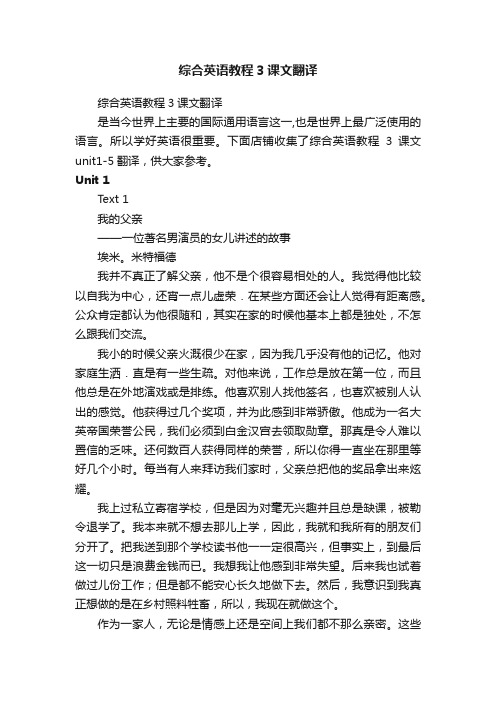
综合英语教程3课文翻译综合英语教程3课文翻译是当今世界上主要的国际通用语言这一,也是世界上最广泛使用的语言。
所以学好英语很重要。
下面店铺收集了综合英语教程3课文unit1-5翻译,供大家参考。
Unit 1Text 1我的父亲——一位著名男演员的女儿讲述的故事埃米。
米特福德我并不真正了解父亲,他不是个很容易相处的人。
我觉得他比较以自我为中心,还宵一点儿虚荣.在某些方面还会让人觉得有距离感。
公众肯定都认为他很随和,其实在家的时候他基本上都是独处,不怎么跟我们交流。
我小的时候父亲火溉很少在家,因为我几乎没有他的记忆。
他对家庭生洒.直是有一些生疏。
对他来说,工作总是放在第一位,而且他总是在外地演戏或是排练。
他喜欢别人找他签名,也喜欢被别人认出的感觉。
他获得过几个奖项,并为此感到非常骄傲。
他成为一名大英帝国荣誉公民,我们必须到白金汉宫去领取勋章。
那真是令人难以置信的乏味。
还何数百人获得同样的荣誉,所以你得一直坐在那里等好几个小时。
每当有人来拜访我们家时,父亲总把他的奖品拿出来炫耀。
我上过私立寄宿学校,但是因为对毫无兴趣并且总是缺课,被勒令退学了。
我本来就不想去那儿上学,因此,我就和我所有的朋友们分开了。
把我送到那个学校读书他一一定很高兴,但事实上,到最后这一切只是浪费金钱而已。
我想我让他感到非常失望。
后来我也试着做过儿份工作;但是都不能安心长久地做下去。
然后,我意识到我真正想做的是在乡村照料牲畜,所以,我现在就做这个。
作为一家人,无论是情感上还是空间上我们都不那么亲密。
这些日子我们彼此很少见面。
我和父亲就像石膏和奶酪’一样完全不同。
我的兴趣一直都在乡村,而他则喜欢书本和音乐,尤其是歌剧,这恰恰是我所讨厌的。
如果他们来看我们,他们的衣着也完全不适合在乡村穿——貂皮大衣和漂亮的但不适合在田间走长路的小皮鞋。
父亲对我结婚更是完全反对。
他一直希望我和我的丈夫分开。
查拉德太卑微了,我想。
而父亲一定是怨让我嫁给一个有名望的人,但我没有。
研究生英语综合教程unit 3

3. The unrighteous penny corrupt righteous pound.
贪小便宜破大财。
indignation
[͵indig'nei∫ən]
anger or scorn aroused by something felt to be unfair, unworthy, or wrong 愤怒,愤慨,不平,义愤
miscellaneous
[misə′leiniəs]
不同种类的, 多种多样的; 混杂的
E.g. 1. a ~~ collection of goods 一批杂货 2. miscellaneous odds and ends 零碎杂物
3. The report was buried under ~~ papers. 那份报告被各种各样的文件所覆盖。
equation
[i′kweiʃən]
1.方程式, 等式 2.相等, 平衡 3.相等;等同看待 E.g. 1. The solution can be expressed by a mathematical equation. 答案可用一个数学方程式来表示。 2. equation of the first ( second …) order (数)一次(或二次等)方程
Vocabulary
Analysis of text Exercises Writing & Translating
dilemma
[di′lemə]
1.左右为难, 进退两难
E.g.
2.窘境,困境
1. be in a dilemma 处在进退两难的境地 2. She was in a dilemma whether to stay at school or get a job.
高等学校研究生英语综合教程上Unit3

Starting out—Task 1
1. To be able to fill leisure intelligently is the last product of civilization. —Arnold Toynbee
Starting out
Brief Encounter (1945): Nothing gets more _g_l_a_m_o_r_o_u_s____ than that. No, this is no category script, David Lynn’s direction. It is a masterpiece of holding back and I think since it was made _d_u_r_in_g__W__W__I_I, it was all about ___s_a_c_r_if_ic_e___ and keeping things together and it’s just brimming with the _u_n_e_x_p_r_e_s_s_e_d_ and the unacted-upon. _T_o_r_tu__re_d___ love is the best kind.
British economic historian and social reformer
Interpretation: The quotation implies that how to spend leisure time in a smart way are a mirror of how civilized a society is.
综合教程3课文翻译TheLandoftheLock(Unit3TextA)

Unit 3 SecurityText AYears ago in America, it was customary for families to leave their doors unlocked, day and night. In this essay, Greene regrets that people can no longer trust each other and have to resort to elaborate security systems to protect themselves and their possessions.许多年前,在美国,家家户户白天黑夜不锁门是司空见惯的。
在本文中,格林叹惜人们不再相互信任,不得不凭借设计精密的安全设备来保护自己和财产。
The Land of the LockBob Greene锁之国1 In the house where I grew up, it was our custom to leave thefront door on the latch at night. I don't know if that was a local term or if it is universal; "on the latch" meant the door was closed but not locked. None of us carried keys; the last one in for the evening would close up, and that was it.小时候在家里,我们的前门总是夜不落锁。
我不知道这是当地的一种说法还是大家都这么说;"不落锁"的意思是掩上门,但不锁住。
我们谁都不带钥匙;晚上最后一个回家的人把门关上,这就行了。
2 Those days are over. In rural areas as well as in cities, doors do not stay unlocked, even for part of an evening.那样的日子已经一去不复返了。
新编研究生综合英语教程UNIT3(潘海英)

Text A The Values Americans Live By
• Text Explanation & Translation
July 4, 1776. It was regarded as the
nation’s most cherished symbol of liberty
and Jefferson’s most enduring monument.
“We hold these truths to be self-evident,
:
2. Information about cultural identity
In recent decades, a new form of identification has emerged which breaks down the understanding of the individual as a coherent whole subject into a collection of various cultural identifiers. These cultural identifiers may be the result of various conditions including: locality, gender, race, history, nationality, language, sexuality, religion, ethnicity, aesthetics, and even food. Therefore, cultural identity refers to a feeling of belonging to a group. It is part of a person's self-conception and self-perception and is related to these cultural identifiers or any kind of social group that has its own distinct culture. In this way, cultural identity is both characteristic of the individual but also of the culturally identical group of members sharing the same cultural identity. Cultural identity can also be expressed through certain styles of clothing or other aesthetic markers.
unit3硕士英语综合教程课文翻译
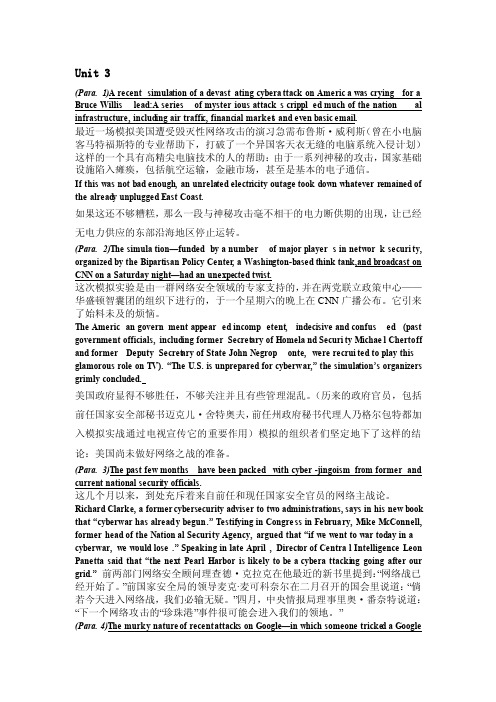
Unit 3(Para. 1)A recentsimulat ion of a devasta ting cyberat tack on America was cryingfor a Bruce Willislead:A seriesof mysteri ous attacks cripple d much of the nationa l infrast ructur e, includi ng air traffic, financi al markets and even basic email.最近一场模拟美国遭受毁灭性网络攻击的演习急需布鲁斯·威利斯(曾在小电脑客马特福斯特的专业帮助下,打破了一个异国客天衣无缝的电脑系统入侵计划)这样的一个具有高精尖电脑技术的人的帮助:由于一系列神秘的攻击,国家基础设施陷入瘫痪,包括航空运输,金融市场,甚至是基本的电子通信。
If this was not bad enough, an unrelat ed electri city outagetook down whateve r remaine d of the already unplugg ed East Coast.如果这还不够糟糕,那么一段与神秘攻击毫不相干的电力断供期的出现,让已经无电力供应的东部沿海地区停止运转。
(Para. 2)The simulat ion—fundedby a numberof major players in network securit y, organiz ed by the Biparti san PolicyCenter, a Washing ton-based think tank,and broadca st on CNN on a Saturda y night—had an unexpec ted twist.这次模拟实验是由一群网络安全领域的专家支持的,并在两党联立政策中心——华盛顿智囊团的组织下进行的,于一个星期六的晚上在CNN广播公布。
研究生英语综合教程下第三单元课文中英文对照熊海虹
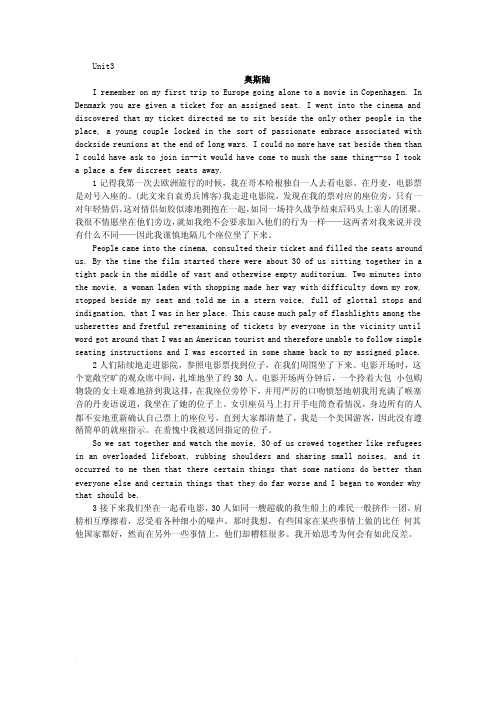
Unit3奥斯陆I remember on my first trip to Europe going alone to a movie in Copenhagen. In Denmark you are given a ticket for an assigned seat. I went into the cinema and discovered that my ticket directed me to sit beside the only other people in the place, a young couple locked in the sort of passionate embrace associated with dockside reunions at the end of long wars. I could no more have sat beside them thanI could have ask to join in--it would have come to mush the same thing--so I tooka place a few discreet seats away.1记得我第一次去欧洲旅行的时候,我在哥本哈根独自一人去看电影。
在丹麦,电影票是对号入座的。
(此文来自袁勇兵博客)我走进电影院,发现在我的票对应的座位旁,只有一对年轻情侣。
这对情侣如胶似漆地拥抱在一起,如同一场持久战争结束后码头上亲人的团聚。
我很不情愿坐在他们旁边,就如我绝不会要求加入他们的行为一样——这两者对我来说并没有什么不同——因此我谨慎地隔几个座位坐了下来。
People came into the cinema, consulted their ticket and filled the seats around us. By the time the film started there were about 30 of us sitting together in a tight pack in the middle of vast and otherwise empty auditorium. Two minutes into the movie, a woman laden with shopping made her way with difficulty down my row, stopped beside my seat and told me in a stern voice, full of glottal stops and indignation, that I was in her place. This cause much paly of flashlights among the usherettes and fretful re-examining of tickets by everyone in the vicinity until word got around that I was an American tourist and therefore unable to follow simple seating instructions and I was escorted in some shame back to my assigned place.2人们陆续地走进影院,参照电影票找到位子,在我们周围坐了下来。
高等学校研究生英语综合教程上下册Unit原文加翻译

上unit1——TRAITS OF THE KEY PLAYERS关键员工的特征1.What exactly is a key player?A“Key Player"is aphrase that I've heard about from employers during just about every search I've conducted.I asked a client——a hiring manager involved in a recent search—to define it for me."Every company has a handful of staff in a given area of expertise that you can count on to get the job done.On my team of seven process engineers and biologists,I've got two or three whom I just couldn't live without,”he said."Key players are essential to my organization.And when we hire your company to recruit for us,we expect that you'll be going into other companies and finding just that:the staff that another manager will not want to see leave.We recruit only key players.”关键员工到底是什么?在我进行的每一次搜索中,我都会从雇主那里听到“关键员工”这个词。
(完整word版)新发展研究生英语综合教程3.docx
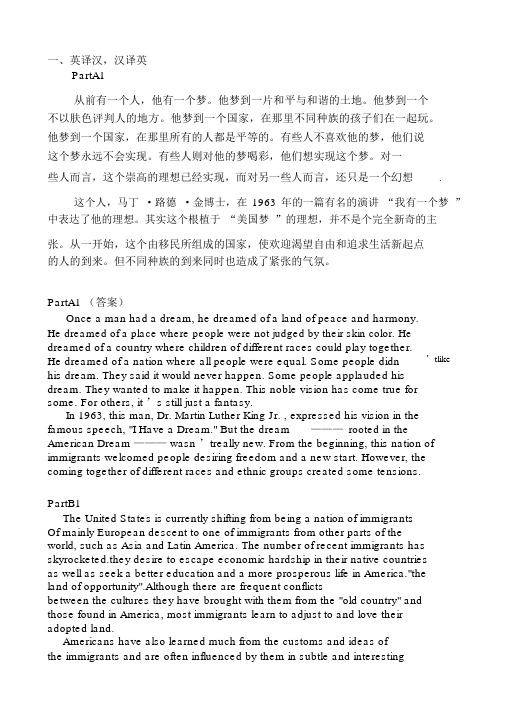
一、英译汉,汉译英PartA1从前有一个人,他有一个梦。
他梦到一片和平与和谐的土地。
他梦到一个不以肤色评判人的地方。
他梦到一个国家,在那里不同种族的孩子们在一起玩。
他梦到一个国家,在那里所有的人都是平等的。
有些人不喜欢他的梦,他们说这个梦永远不会实现。
有些人则对他的梦喝彩,他们想实现这个梦。
对一些人而言,这个崇高的理想已经实现,而对另一些人而言,还只是一个幻想.这个人,马丁·路德·金博士,在1963 年的一篇有名的演讲“我有一个梦”中表达了他的理想。
其实这个根植于“美国梦”的理想,并不是个完全新奇的主张。
从一开始,这个由移民所组成的国家,使欢迎渴望自由和追求生活新起点的人的到来。
但不同种族的到来同时也造成了紧张的气氛。
PartA1 (答案)Once a man had a dream, he dreamed of a land of peace and harmony.He dreamed of a place where people were not judged by their skin color. He dreamed of a country where children of different races could play together.’tlike He dreamed of a nation where all people were equal. Some people didnhis dream. They said it would never happen. Some people applauded hisdream. They wanted to make it happen. This noble vision has come true forsome. For others, it ’s still just a fantasy.In 1963, this man, Dr. Martin Luther King Jr. , expressed his vision in thefamous speech, "I Have a Dream." But the dream———rooted in the American Dream ——— wasn ’treally new. From the beginning, this nation of immigrants welcomed people desiring freedom and a new start. However, the coming together of different races and ethnic groups created some tensions.PartB1The United States is currently shifting from being a nation of immigrantsOf mainly European descent to one of immigrants from other parts of theworld, such as Asia and Latin America. The number of recent immigrants has skyrocketed.they desire to escape economic hardship in their native countriesas well as seek a better education and a more prosperous life in America."theland of opportunity".Although there are frequent conflictsbetween the cultures they have brought with them from the "old country" andthose found in America, most immigrants learn to adjust to and love theiradopted land.Americans have also learned much from the customs and ideas ofthe immigrants and are often influenced by them in subtle and interestingways.Immigrants bring their native cultural, political, and social patterns and attitudes, varied academic and religious backgrounds, as well as theirethnic arts, sports, holidays, festivals, and foods.They have greatly enriched American life.For immigrants from all parts of the world, the United States has been a "melting pot" in which the foreigners have sometimes remained culturally and linguistically what they were in their native lands, even as they move toward becoming citizens of the United States, a country whose people share a common cultural outlook and set of values.The melting pot does not meltaway all recollections of another way of life in other place———nor should it.On the contrary, immigrants should maintain the languages, skills, religions, customs and arts of their own heritage, even while they are working towards entering the mainstream of American culture.PartB1 (答案)目前,美国正在从一个主要由欧洲移民构成的国家向来自世界各地(如亚洲、拉丁美洲)的移民构成的国家转变,其移民数量骤增。
(完整word版)英语综合教程3unit1~9翻译ⅠⅢ
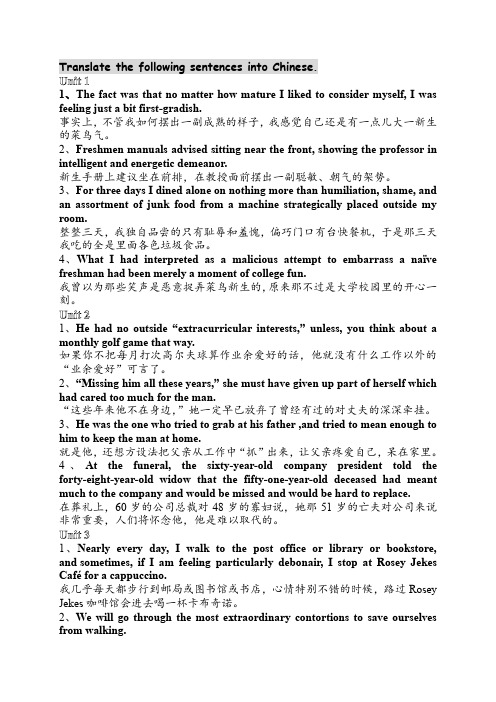
Translate the following sentences into Chinese.1、The fact was that no matter how mature I liked to consider myself, I was feeling just a bit first-gradish.事实上,不管我如何摆出一副成熟的样子,我感觉自己还是有一点儿大一新生的菜鸟气。
2、Freshmen manuals advised sitting near the front, showing the professor in intelligent and energetic demeanor.新生手册上建议坐在前排,在教授面前摆出一副聪敏、朝气的架势。
3、For three days I dined alone on nothing more than humiliation, shame, and an assortment of junk food from a machine strategically placed outside my room.整整三天,我独自品尝的只有耻辱和羞愧,偏巧门口有台快餐机,于是那三天我吃的全是里面各色垃圾食品。
4、What I had interpreted as a malicious attempt to embarrass a naïve freshman had been merely a moment of college fun.我曾以为那些笑声是恶意捉弄菜鸟新生的,原来那不过是大学校园里的开心一刻。
1、He had no outside “extracurricular interests,” unle ss, you think about a monthly golf game that way.如果你不把每月打次高尔夫球算作业余爱好的话,他就没有什么工作以外的“业余爱好”可言了。
(完整word版)新发展研究生英语综合教程3
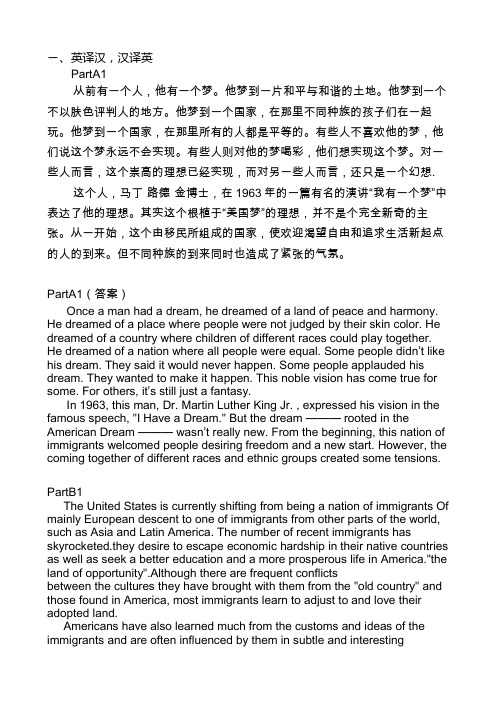
一、英译汉,汉译英PartA1从前有一个人,他有一个梦。
他梦到一片和平与和谐的土地。
他梦到一个不以肤色评判人的地方。
他梦到一个国家,在那里不同种族的孩子们在一起玩。
他梦到一个国家,在那里所有的人都是平等的。
有些人不喜欢他的梦,他们说这个梦永远不会实现。
有些人则对他的梦喝彩,他们想实现这个梦。
对一些人而言,这个崇高的理想已经实现,而对另一些人而言,还只是一个幻想.这个人,马丁·路德·金博士,在1963年的一篇有名的演讲“我有一个梦”中表达了他的理想。
其实这个根植于“美国梦”的理想,并不是个完全新奇的主张。
从一开始,这个由移民所组成的国家,使欢迎渴望自由和追求生活新起点的人的到来。
但不同种族的到来同时也造成了紧张的气氛。
PartA1(答案)Once a man had a dream, he dreamed of a land of peace and harmony. He dreamed of a place where people were not judged by their skin color. He dreamed of a country where children of different races could play together. He dreamed of a nation where all people were equal. Some people didn’t like his dream. They said it would never happen. Some people applauded his dream. They wanted to make it happen. This noble vision has come true for some. For others, it’s still just a fantasy.In 1963, this man, Dr. Martin Luther King Jr. , expressed his vision in the famous speech, "I Have a Dream." But the dream ——— rooted in the American Dream ——— wasn’t really new. From the beginning, this nation of immigrants welcomed people desiring freedom and a new start. However, the coming together of different races and ethnic groups created some tensions. PartB1The United States is currently shifting from being a nation of immigrants Of mainly European descent to one of immigrants from other parts of the world, such as Asia and Latin America. The number of recent immigrants has skyrocketed.they desire to escape economic hardship in their native countries as well as seek a better education and a more prosperous life in America."the land of opportunity".Although there are frequent conflictsbetween the cultures they have brought with them from the "old country" and those found in America, most immigrants learn to adjust to and love their adopted land.Americans have also learned much from the customs and ideas of the immigrants and are often influenced by them in subtle and interestingways.Immigrants bring their native cultural, political, and social patterns and attitudes, varied academic and religious backgrounds, as well as their ethnic arts, sports, holidays, festivals, and foods.They have greatly enriched American life.For immigrants from all parts of the world, the United States has been a "melting pot" in which the foreigners have sometimes remained culturally and linguistically what they were in their native lands, even as they move toward becoming citizens of the United States, a country whose people share a common cultural outlook and set of values.The melting pot does not melt away all recollections of another way of life in other place———nor should it. On the contrary, immigrants should maintain the languages, skills, religions, customs and arts of their own heritage, even while they are working towards entering the mainstream of American culture.PartB1(答案)目前,美国正在从一个主要由欧洲移民构成的国家向来自世界各地(如亚洲、拉丁美洲)的移民构成的国家转变,其移民数量骤增。
研究生英语综合教程3

2021/10/10
22
• J.K. Rowling was born in England on July 30, 1965. The idea for Harry Potter came to Rowling in 1990 during a ride train from Manchester to London. She saw a little thin boy smiling at her outside the window, with black hair and glasses, who became Harry Potter in the books.
• A disadvantage of the first four books is an absence of an interesting villain.
• Publicatin of the fourth book appeals to a large number of children.
• To discuss Chinese people’s attitude towards work and life
• To translate adverbial clauses
• To grasp some important words and phrases
2021/10/10
3
Starting out
• Harry Potter books are challenged by some parents and religious leaders.
• The way with naming people and things is quirky and original. • There is every reason to say that Harry Potter possesses all the
研究生英语综合教程英语原文Unit3

研究生英语综合教程英语原文Unit3Unit Three Leisure without literature is death and burial alive. —Seneca, Roman philosopherWHY HARRY'S HOT?1 J. K. Rowling swears she never saw it coming. In her wildest dreams, she didn't think her Harry Potter books would appeal to more than a handful of readers. "I never expected a lot of people to like them," she insisted in a recent interview. "Well, it turned out I was very wrong, obviously. It strikes a chord with an enormous number of people." That's putting it mildly. With 35 million copies in print, in 35 languages, the first three Harry Potter books have earned a conservatively estimated $480 million in three years. And that was just the warm-up. With a first printing of 5.3 million copies and advance orders topping 1.8 million, Harry Potter and the Goblet of Fire, the fourth installment of the series, promises to break every bookselling record. Jack Morrissey, 12, plainly speaks for a generation of readers when he says, "The Harry Potter books are like life, but better."2 Amazingly, Rowling keeps her several plotlines clear of each other until the end, when he deftly brings everything together in a cataclysmic conclusion. For pure narrative power, this is the best Potter book yet.3 When the book finally went on sale at 12:01 am. Saturday, thousands of children in Britain and North America rushed to claim their copies. Bookstores hosted pajama parties, hired magicians and served cookies and punch, but nobody needed to lift the spirits of these crowds. In one case, customers made such a big, happy noise that neighbors called the cops. At aBorders in Charlotte, N.C., Erin Rankin, 12, quickly thumbedto the back as soon as she got her copy. “I heard that a_ m ajor character dies,and I really want to find out who," she said. But minutes later she gave up. “I just can't do it. I can't read the end first."4 The only sour note in all the songs of joy over this phenomenon has come from some parents and conservative religious leaders who say Rowling advocates witchcraft. reading of the books has been challenged in 25 school districts in at least 17 states, and the books have been banned in schools in Kansas and Colorado. But that's nothing new, says Michael Patrick Hearn, a children's book scholar and editor of The Annotated Wizard, of Oz. "Any kind of magic is considered evil by some people," he says. "The Wizard of Oz was attacked by fundamentalists in the mid-1980s."5 But perhaps the most curious thing about the Potter phenomenon, especially given that it is all about books, is that almost no one has taken the time to say how good— or bad—these books are. The other day my 11-year-old daughter asked me if I thought Harry Potter was a classic. I gave her, I'm afraid, one of those adult-sounding answers when I said, "Time will tell." This was not an outright lie. There's no telling which books will survive from one generation to the next. But the fact is, I was hedging. What my daughter really wanted to know was how well J. K. Rowling stacks up against the likes of Robert Louis Stevenson or Madeleine L'Engle.6 I could have told her that I thought they were beautifully crafted works of entertainment, the literary equivalent of Steven Spielberg. I could also have told her I thought the Potter books were derivative. They share so many elements with so many children's classics that sometimes it seems as though Rowlinghad assembled her novels from a kit. However, these novels amount to, much more than just the sum of their parts. The crucial aspect of their appeal is that they can beread by children and adults with equal pleasure. Only the best authors—and they can be as different as Dr. Seuss and Philip Pullman" and, yes, J.|K. Rowling—can pull that off.7 P. L. Travers, the author of the Mary Poppins books, put it best when she wrote, "You do not chop off a section of your imaginative substance and make a book specifically for children, for—if you are honest—you have, in fact, no idea where childhood ends and maturity begins. It is all endless and all one. There is plenty for children and adults to enjoy in Rowling's books, starting with their language. Her prose may be unadorned, but her way with naming people and things reveals a quirky and original talent.8 The best writers remember what it is like to be a child with astonishing intensity. Time and again, Rowling articulates just how defenseless even the bravest children often feel. Near the end of the second book Dumbledore, the wise and protective headmaster, is banished from Hogwarts. This terrifies Harry and his schoolmates—"With Dumbledore gone, fear had spread as never before"—and it terrified me. And in all of Rowling's books there runs an undercurrent of sadness and loss. In the first book the orphaned Harry stares into the Mirror of Erised, which shows the viewer his or her utmost desires. Harry sees his dead parents. "Not until I'd reread what I'd written did I realize that that had been taken entirely- entirely- from how I felt about my mother's death," Rowling said. "In fact, death and bereavement and what death means, I would say, is one of the central themes in all seven books." Do young readers pick up on all this deep intellectualism?Consciously, perhaps not. But I don't think the books would have their broad appeal if they were only exciting tales of magical adventure, and I know adults would not find them so enticing.9 The Harry Potter books aren't perfect. What I miss most in these novels is the presence of a great villain. And by great villain I mean an interesting villain. Long. John Silver is doubly frightening because he is both evil and charming. If he were all Bad, he wouldn't frighten us half as much. Voldemort is resistible precisely because he is just bad to the bone. That said, I should add that in the new book Rowling outdoes herself with a bad guy so seductive you'll never see him coming. And he is scary.10 That quibble aside, Rowling?s novels are probably the best books children have ever encountered that haven't been thrust upon them by an adult. I envy kids reading these books, because there was nothing this good when I was a boy-nothing this good, I mean, that we found on our own, the way kids are finding Harry. We affectionately remember The Hardy Boys and Nancy Drew, but try rereading them and their charm fades away pretty quickly. Rowling may not be as magisterial as Tolkien or as quirky as Dahl, but her books introduce fledgling readers to a very high standard of entertainment. With three books left to go in the series, it's too early to pass final judgment. But considering what we've seen so far, especially in the latest volume, Harry Potter has all the earmarks of a classic.。
研究生英语综合第三单元翻译

The main opposition Socialist Party was divided, with key leaders saying it would be foolhardy to abandon a nuclear energy program that has stood since the 1970s but several Socialist figures demanding a reconsideration of nuclear safety measures.Europe Ecology-Greens Party activists, long opposed to nuclear power, called for a referendum on whether France should get out of the nuclear business and accused the government of playing down the risks.“We have to end the myths,” said Cecile Duflot, a pro minent Green leader.“Zero-risk nuclear power production does not exist.In Russia, Ukraine and Belarus—which will mark the 25th anniversary of the Chernobyl disaster this April —the crisis in Japan has served as a reminder of the dangers of nuclear po wer, but national leaders say they don’t see any alternative.主要反对党社会党内存在着意见分歧:其主要领导人认为放弃自上世纪七十年代就存在的核能计划将是鲁莽之举,而另一些社会党人则要求重新考虑核安全措施问题。
综合教程3课文原文翻译
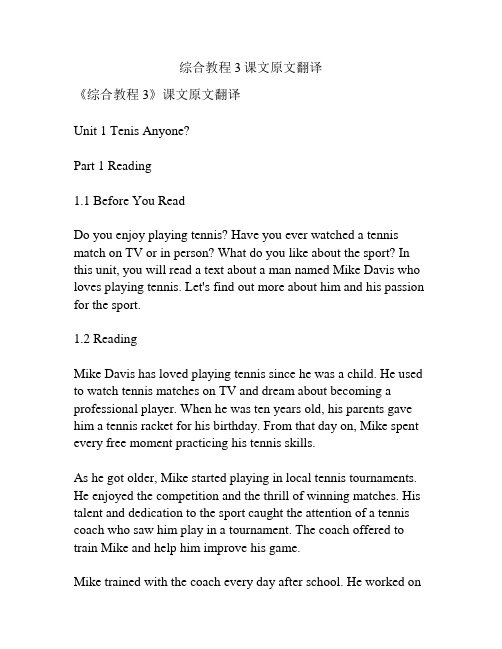
综合教程3课文原文翻译《综合教程3》课文原文翻译Unit 1 Tenis Anyone?Part 1 Reading1.1 Before You ReadDo you enjoy playing tennis? Have you ever watched a tennis match on TV or in person? What do you like about the sport? In this unit, you will read a text about a man named Mike Davis who loves playing tennis. Let's find out more about him and his passion for the sport.1.2 ReadingMike Davis has loved playing tennis since he was a child. He used to watch tennis matches on TV and dream about becoming a professional player. When he was ten years old, his parents gave him a tennis racket for his birthday. From that day on, Mike spent every free moment practicing his tennis skills.As he got older, Mike started playing in local tennis tournaments. He enjoyed the competition and the thrill of winning matches. His talent and dedication to the sport caught the attention of a tennis coach who saw him play in a tournament. The coach offered to train Mike and help him improve his game.Mike trained with the coach every day after school. He worked onhis technique and practiced different shots. He learned how to serve, volley, and hit powerful groundstrokes. The coach also taught him about the mental aspect of the game, such as staying focused and confident during a match.With years of training, Mike's skills improved significantly. He started winning more tournaments and gaining recognition in the tennis community. People started talking about his potential as a professional player. However, Mike knew that becoming a professional tennis player was not an easy path.In college, Mike played for his university's tennis team. He competed against other college players and learned valuable lessons from each match. His skills continued to improve, and he became one of the top college tennis players in the country.After graduating from college, Mike decided to pursue a career as a professional tennis player. He knew it would be a challenging journey, but he was determined to give it his best shot. He joined the professional tennis circuit and started playing in international tournaments.Mike faced many ups and downs in his professional career. He experienced injuries, defeats, and moments of self-doubt. However, he never gave up on his dreams. He continued to work hard, improve his skills, and stay motivated.After years of hard work and perseverance, Mike achieved his dream of becoming a professional tennis player. He reached the top rankings in the world and won several prestigious tournaments.His dedication and love for the sport paid off, and he became an inspiration for aspiring tennis players around the world.1.3 Understanding the Text1. Why did Mike Davis start playing tennis?Mike Davis started playing tennis because he loved the sport. He used to watch tennis matches on TV and dream about becoming a professional player.2. How did Mike improve his tennis skills?Mike improved his tennis skills by practicing every day after school with a tennis coach. He worked on his technique, learned different shots, and focused on the mental aspect of the game.3. What challenges did Mike face in his professional career?Mike faced injuries, defeats, and moments of self-doubt in his professional career.4. What did Mike achieve in his tennis career?Mike achieved his dream of becoming a professional tennis player. He reached the top rankings in the world and won several prestigious tournaments.5. How did Mike's love for tennis inspire others?Mike's dedication and love for the sport inspired aspiring tennis players around the world.Part 2 Vocabulary and Grammar2.1 Vocabulary PreviewRead the following sentences from the text. Use context clues to guess the meanings of the underlined words.1. Mike's talent and dedication to the sport caught the attention of a tennis coach.2. He competed against other college players and learned valuable lessons from each match.3. Mike faced many ups and downs in his professional career.2.2 Grammar in ContextRead the following sentences from the text. Use the information in the parentheses to choose the correct verb form.1. Mike's parents gave him a tennis racket for his birthday. (past simple/ past continuous)2. He joined the professional tennis circuit and started playing in international tournaments. (past simple/ present continuous)3. His dedication and love for the sport paid off, and he became an inspiration for aspiring tennis players around the world. (past simple/ present perfect)2.3 Language ActivitiesComplete the following sentences with the correct form of the verbs in parentheses.1. Mike __________ tennis matches on TV when he was a child. (watch)2. His coach __________ him improve his game. (help)3. Mike __________ many tournaments throughout his career. (win)4. After years of hard work, his dream _______. (come true)。
新编研究生综合英语教程UNIT3汉译英讲解及答案
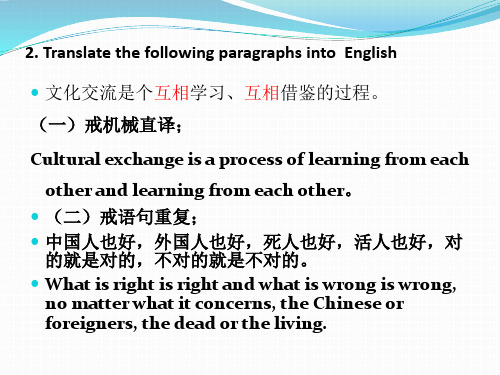
重复的名词写成被修饰的词,第二个句子出现这个名
词要写成定语。 例子:2001年,反倾销案件猛增到创纪录的348起,这 个统计数字(348)表明贸易保护主义正在迅速的蔓延, (贸易保护主义)并日益成为国际贸易中一个严重的 问题。 Anti-dumping cases suddenly rose to a record high of 348,indicating a rapid speed of trade protectionism , an increasingly serious problem in international trade.
(三)主语、宾语里有动宾关系可以写成名词+of+名词的形式,by引导动作执行者
文化交流是个互相学习、互相借鉴的过程。 The cultural exchange is a process of learning and drawing on experience from each other. 例句: 旅游基础设施大量侵占沿海土地,这严重地破坏了脆弱的 陆地生态系统和湿地。 The occupation of coastal areas by tourist infrastructure leads to destruction of vulnerable terrestrial ecosystems and wetlands. 西方社会一味地追求经济发展,总体看来,非但没有优化 人们的社会生活,相反有恶化趋势。 The continue pursuit of economic growth by Western Societies is to reduce rather than increase social welfare.
- 1、下载文档前请自行甄别文档内容的完整性,平台不提供额外的编辑、内容补充、找答案等附加服务。
- 2、"仅部分预览"的文档,不可在线预览部分如存在完整性等问题,可反馈申请退款(可完整预览的文档不适用该条件!)。
- 3、如文档侵犯您的权益,请联系客服反馈,我们会尽快为您处理(人工客服工作时间:9:00-18:30)。
UNIT 31. Most Americans would have a difficult time telling you, specifically, what the values are that Americans live by. They have never given the matter much thought.2. Even if Americans had considered this question, they would probably, in the end, decide not to answer in terms of a definitive list of values. The reason for this decision is itself one very American value — their belief that every individual is so unique that the same list of values could never be applied to all, or even most, of their fellow citizens.3. Although Americans may think of themselves as being more varied and unpredictable than they actually are, it is significant that they think they are. Americans tend to think they have been only slightly influenced by family, church or schools. In the end, each believes, “I personally chose which values I want to live my own life by.”4. The different behaviors of a people or a culture make sense only when seen through the basic beliefs, assumptions and values of that particular group. When you encounter an action, or hear a statement in the United States that surprises you, try to see it as an expression of one or more of the values listed here.5. Before proceeding to the list itself, we should also point out that Americans see all of these values as very positive ones. They are not aware, for example, that the people in many Third World countries view some of these values as negative or threatening.In fact, all of these American values are judged by many of the world’s citizens as negative and undesirable. Therefore, it is not enough simply to familiarize yourself with these values. You must also, so far as possible, consider them without the negative or derogatory connotation that they might have for you, based on your own experience and cultural identity.Personal Control over the Environment6. Americans no longer believe in the power of Fate, and they have come to look at people who do as being backward, primitive, or hopelessly naive. To be called “fatalistic” is one of the worst criticisms one can receive in the American context; to an American, it means one is superstitious and lazy, unwilling to take any initiative in bringing about improvement.7. In the United States, people consider it normal and right that Man should control Nature, rather than the other way around. More specifically, people believe every single individual should have control over whatever in the environment might potentially affect him or her. 1.大多数美国人在谈起其赖以生存的价值观时会感到力不从心。
他们从未仔细考虑过价值观这个问题。
2. 即使美国人考虑过这个问题,他们最终也不可能决定以一张明确的价值观清单来回答。
做出这样的一个决定,本身就是一个非常美国式的价值观——他们相信每个个体都是独一无二的,相同的价值观永远也不可能适用于所有的美国公民,甚至不能适用于大多数公民。
3. 尽管美国人可能认为他们自己比实际看上去更加变幻莫测,但重要的是他们的确认为自己变幻莫测。
美国人普遍认为他们受家庭、教会或学校影响很轻微。
最终,每个人都认为“我个人会根据自己生活方式选择我的价值观”。
4. 一个民族的不同行为方式或者一种文化之所以有意义,是因为人们通过该民族的基本信仰、看法和价值观念来看待它们。
在美国,如果某一个行为或某一句话使你感到吃惊,那么你可以将其与下面罗列的价值观对号入座。
5. 在探讨这个清单之前, 有必要指出美国人认为这些价值观是充满正能量的。
他们没有意识到许多第三世界国家的人们可能认为其中一些价值观是消极或者可怕的。
事实上,许多外国人认为美国人的这些价值观是消极和不受欢迎的。
因此,仅仅熟悉这些价值观是不够的,还必须尽可能做到不因自身经历和文化身份而对这些价值观有负面和贬损的看法。
对环境的自我把握6. 美国人不再相信命运的力量,那些相信此道的人被认为是落后、原始和极其幼稚的。
在美国语境下,“宿命论者”是对一个人最糟糕的评价之一;对美国人来说,这一评价意味着这个人迷信、懒惰且不思进取。
7. 在美国, 人们认为人定胜天, 而非受制于自然的观点既正常又正确。
更确切地说,人们相信每个人都应该控制周围环境中任何可能影响到自己的因素。
The problems of one’s life are not seen as having resulted from bad luck as much as having come from one’s laziness in pursuing a better life. Furthermore, it is considered normal that anyone should look out for his or her own self-interests first and foremost.Time and Its Control8. Time is, for the average American, of utmost importance. To the foreign visitor, Americans seem to be more concerned with getting things accomplished on time (according to a predetermined schedule) than they are with developing deep interpersonal relations. Schedules, for the American, are meant to be planned and then followed in the smallest detail.9. It may seem to you that most Americans are completely controlled by the little machines they wear on their wrists, cutting their discussions off abruptly to make it to their next appointment on time.10. Americans’ language is filled with references to time, giving a clear indication of how much it is valued. Time is something to be “on,” to be “kept,” “filled,” “saved,” “used,” “spent,” “wasted,” “lost,” “gained,” “planned,” “given,” “made the most of,” even “killed.”11. The international visitor soon learns that it is considered very rude to be late — even by 10 minutes — for an appointment in the United States. (Whenever it is absolutely impossible to be on time, you should phone ahead and tell the person you have been unavoidably detained and will be a half hour — or whatever — late.)Equality12. Equality is, for Americans, one of their most cherished values. This concept is so important for Americans that they have even given it a religious basis. They say all people have been “created equal.” Most Americans believe that God views all humans alike without regard to intelligence, physical condition or economic status.In secular terms this belief is translated into the assertion that all people have an equal opportunity to succeed in life. Americans differ in opinion about how to make this ideal into a reality. Yet virtually all agree that equality is an important civic and social goal.13. The equality concept often makes Americans seem strange to foreign visitors. Seven-eighths of the world feels quite differently. To them, rank and status and authority are seen as much more desirable considerations — even if they personally happen to find themselves near the bottom of the social order.Class and authority seem to give people in those other societies a sense of security and certainty. People outside the United States consider it reassuring to know, from birth, who they are and where they fit into the 一个人在追求美好生活的过程中出现挫折人们不认为是因为运气差,而是由自己的懒惰所导致。
